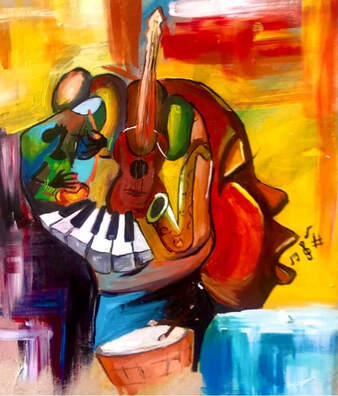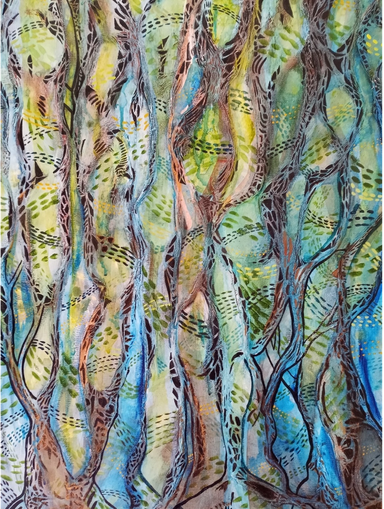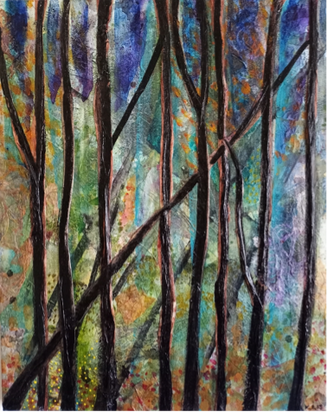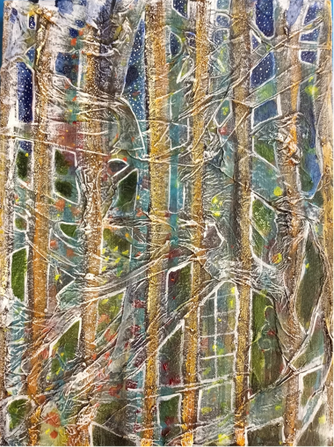Presentation – In the Margins of Music History
By Sarah-Anne Arsenault
With the collaboration of Benedictus Mattson
In the Margins of Music History: Disrupting the Colonial Narrative
Dans les marges de l’histoire de la musique : ébranler le récit colonial
Co-edited by Sarah-Anne Arsenault and Benedictus Mattson
Dans les marges de l’histoire de la musique : ébranler le récit colonial
Co-edited by Sarah-Anne Arsenault and Benedictus Mattson
We are delighted to present this special issue of L'Écouteur, which features the works of eight Canadian undergraduate music students. Each offers a perspective that disrupts the traditional narrative of Western classical music history, which has been scarred by colonialism (Dharmoo 2019; Walker 2020), by illuminating aspects that have long been kept in the margins. By the traditional narrative, we mean the one that still seems to dominate in university music programs, in Canada and elsewhere (Attas 2019; Bradley 2015; Carver 2017; Figueroa 2020; Madrid 2016; Santos and Peters 2023). This narrative, largely inherited from the 19th century, tends to present the history of music within a framework that is simultaneously Eurocentric, evolutionary and colonial. This history largely neglects its external influences, such as local, non-Western or oral tradition music, and focuses on a limited set of white, male, European composers and works, distributed within a series of stylistic epochs supposedly reflecting increasing musical sophistication (P. Bouliane et al. 2024 ; Walker 2020).
 Edinam Mattson, The Awakening, 2023,
Edinam Mattson, The Awakening, 2023, 10x11in, acrylics on art paper.
Challenging this narrative has certainly been the subject of numerous works, as successfully demonstrated by the articles in this issue, all of which build on existing research. Nevertheless, although several interesting initiatives are underway or completed (Hijleh 2019; Schofield 2016; Strohm 2019)1, pedagogical resources for approaching and teaching these alternative perspectives remain insufficient2. The project “Changing Colonial Narratives in Eurocentric Music History” (SSHRC IDG 2021-2023) aimed to address this need by cataloguing and examining resources and scholarly writings that challenge, reshape, or oppose the traditional narrative of music history. One of the project’s goals was to make accessible a large textual and multimedia database (articles, books, book chapters, documentaries, etc.) that offers a multitude of alternative perspectives on this narrative. However, significant challenges remain, including the scarcity of articles available in languages other than English and the difficulty of addressing the history of oral musics, such as African musics, due to the overvaluation of written sources in academia (Agawu 2007).
 Katia Breton, Bruissement, 2013, 18x24in, collage and
Katia Breton, Bruissement, 2013, 18x24in, collage and acrylic on canvas.
Since 2021, a student laboratory3 established at Mount Allison University (New Brunswick) has enabled several undergraduate music students to catalog and summarize over a hundred relevant resources--non-colonial, non-Eurocentric, non-canonical, etc.—on the history of music before 1750.
From this corpus, some students have undertaken personal research projects on various subjects, leading to presentations at conferences, pedagogical workshops, and first articles. These articles make up this special issue, and have been carefully revised through a supportive process that was both rigorous and educational. At around 1,000 words each, the “vignettes” gathered here highlight a unique approach to student research, focusing on what, in the eyes of the young authors, deserves to be unearthed from the margins of music history.
Opening the issue, Clare Lowe invites us to broaden our understanding of the trajectories of vocal polyphony by using the example of West Georgian polyphonic chant, presenting its characteristics as arguments for its inclusion in undergraduate music programs. In a similar vein, Emma Yee presents the choral music of the Philippines through its relationship with colonization and independence, highlighting how the colonial heritage has been constantly renegotiated by Filipino musicians, resulting in a diversity of hybrid musical practices. Anna Haguette turns her attention to flamenco, Spain's national musical genre, which is conspicuously absent from music history courses. She argues that both its historical narrative and its characteristics should make it an essential genre to study.
 Katia Breton, Contraste, 2013, 16x20in,
Katia Breton, Contraste, 2013, 16x20in, collage and acrylic on canvas.
Taking a different approach, Emma Cameron emphasizes the importance of focusing not only on marginalized elements but also on those that seem to be taken for granted. Using the biography of Handel, she demonstrates how the lenses of historiography and sociology can deconstruct the seemingly unshakable notion of the “great composer”. In a similar paradigm, Danielle Landry offers insights into the rich history of Chinese musical notations, historically misunderstood by Europeans and consequently excluded from the traditional narrative. Yet, according to the author, Chinese notations invite a critical look at Western notation, which is often mistakenly perceived as the most complex or oldest form of musical notation in history. Lindsey Pike then delves into Rameau’s Les Indes galantes to illustrate the possible application of two multi-contextual theoretical frameworks for analyzing “exoticism” in music. She contends that this is an essential exercise for better understanding works of the past, including how they absorbed and reinforced the ideologies of their time.
 Katia Breton, Untitled, 2023, 12x18in, collage
Katia Breton, Untitled, 2023, 12x18in, collage and acrylic on wood.
The final texts focus on two systematically marginalized populations in the history of Western classical music: Black people and women. In his article, Kiran Steele suggests concrete ways of getting students in a music history course to consider the consequences of racism on the lives of Black musicians in early modern Europe. He emphasizes the importance of both discussing the reasons for their invisibility in the traditional narrative and questioning their visual and textual representations in primary sources.
Finally, Susanne Sevcik concludes this special issue by examining the effects of printing and publishing technologies on the musical activities of English women in the 17th and 18th centuries. By showing that these technologies simultaneously brought printed music into households while limiting it to a narrow and stereotyped repertoire, Sevcik presents a more nuanced picture of women’s musical history than that presented by the traditional narrative.
In conclusion, we are pleased that this special issue now joins the ranks of clear and accessible resources that contribute to illuminate aspects of music history that have been unjustly excluded by its colonial narrative. We are confident that the variety of perspectives presented here will arouse the curiosity of the readers of this journal. A real disruption of the traditional narrative of music history is underway, and we must continue to delve into its margins in order to show that it is precisely these margins that constitute its richness and complexity.
Artists' biographies
Edinam Mattson @e_m.art.son (Instagram)
Edinam Mattson is a Ghanaian artist who holds a Higher National Diploma (HND) in Industrial Arts from the Ho Technical University in Ghana. Edinam’s paintings are informed by the lively sense of color around him. His works are usually drawings of still life, models, and colorful portraits. Edinam has completed numerous works with his free colorful style. After working as a Creative Arts instructor for some time, Edinam is currently a freelance artist who is commissioned on regular basis by art galleries to produce works for clients.
The Awakening is an artwork that depicts the freedom of inclusion in music. The artwork is a painting of a clenched fist (which stands for freedom), merged with a singing face. Within the clenched fist (which also serves as the brain of the singing face) is combination of diverse musical instruments.
Edinam Mattson is a Ghanaian artist who holds a Higher National Diploma (HND) in Industrial Arts from the Ho Technical University in Ghana. Edinam’s paintings are informed by the lively sense of color around him. His works are usually drawings of still life, models, and colorful portraits. Edinam has completed numerous works with his free colorful style. After working as a Creative Arts instructor for some time, Edinam is currently a freelance artist who is commissioned on regular basis by art galleries to produce works for clients.
The Awakening is an artwork that depicts the freedom of inclusion in music. The artwork is a painting of a clenched fist (which stands for freedom), merged with a singing face. Within the clenched fist (which also serves as the brain of the singing face) is combination of diverse musical instruments.
Katia Breton
Since 1997, Katia Breton has been exploring her creativity through the visual arts. She has exhibited her work in Montreal (Galerie 2456, International Flora, Galerie Alternance, parc Molson, galerie Kaf Art, baha’i center, studio Bizz, Mousse café, restaurant Les belles sœurs, Au papier japonais, La boîte gourmande), as well as at the Maison des arts de Laval, Studio P in Quebec City and Galerie Mondo d’Arte in Ottawa. In 2017, she created a tryptique for a doctor’s office in Saguenay.
She has also illustrated various projects including children’s books, puzzles, book and CD covers.
Since 1997, Katia Breton has been exploring her creativity through the visual arts. She has exhibited her work in Montreal (Galerie 2456, International Flora, Galerie Alternance, parc Molson, galerie Kaf Art, baha’i center, studio Bizz, Mousse café, restaurant Les belles sœurs, Au papier japonais, La boîte gourmande), as well as at the Maison des arts de Laval, Studio P in Quebec City and Galerie Mondo d’Arte in Ottawa. In 2017, she created a tryptique for a doctor’s office in Saguenay.
She has also illustrated various projects including children’s books, puzzles, book and CD covers.
Other contributors to this issue
Audrey Cantin-Ouellet (Université Laval), D. Linda Pearse (Mount Allison University), Margaret Walker (Queen's University) et Sandria P. Bouliane (Université Laval).
Bibliography
Agawu, Kofi. 2007. "To Cite or Not to Cite?: Confronting the Legacy of (European) Writing on African Music." Fontes Artis Musicae, vol. 54, no. 3: p. 254-262.
Attas, Robin. 2019. "Strategies for Settler Decolonization: Decolonial Pedagogies in a Popular Music Analysis Course". Canadian Journal of Higher Education, vol. 49, no. 1: p. 125-39. https://doi.org/10.47678/cjhe.v49i1.188281.
Bradley, Deborah. 2015. "Hidden in plain sight: Race and racism in music education". In The Oxford handbook of social justice in music education, edited by Cathy Benedict, Patrick K. Schmidt, Gary Spruce and Paul G. Woodford. New York: Oxford University Press.
Carver, Mandy. 2017. "Knowledge transfer: Indigenous african music in the South African music curriculum". African Music: Journal of the International Library of African Music, vol. 10, no. 3. https://journal.ru.ac.za/index.php/africanmusic/article/view/2199.
Dharmoo, Gabriel. 2019. "Reflections of coloniality in the new music scene". Intersections: Canadian Journal of Music / Intersections : revue canadienne de musique, vol. 39, no. 1: p. 105-121. https://doi.org/10.7202/1075345ar.
Figueroa, Michael A. 2020. "Decolonizing "Intro to World Music?"". Journal of Music History Pedagogy, vol. 10, no. 1: p. 19.
Green, Lucy. 2016. How Popular Musicians Learn: A Way Ahead for Music Education. London: Routledge. https://doi.org/10.4324/9781315253169.
Hess, Juliet. 2015. "Decolonizing music education: Moving beyond tokenism". International Journal of Music Education, vol. 33, no. 3: p. 336-47. https://doi.org/10.1177/0255761415581283.
Hijleh, Mark. 2019. Towards a Global Music History: Intercultural Convergence, Fusion, and Transformation in the Human Musical Story. Abingdon, Oxon; New York, NY: Routledge.
Madrid, Alexandro L. 2016. "Diversity, Tokenism, Non-Canonical Musics, and the Crisis of the Humanities in U.S. Academia | Journal of Music History Pedagogy." Journal of Music History Pedagogy, vol. 7, no. 2: p. 124-130.
P. Bouliane, Sandria, Sarah-Anne Arsenault, D. Linda Pearse et Margaret E. Walker. [2024.] « Remodeler le récit traditionnel de l’histoire de la musique : outils théoriques et pratiques pour l’enseignement universitaire ». Les Cahiers de la SQRM (accepté, à paraître en 2024).
Santos, Daniel Silva dos, and Ana Paula Peters. 2023. "The colonialities experienced by blacks: Reflections to break with colonial naturalizations in music training". Seven Editora. http://sevenpublicacoes.com.br/index.php/editora/article/view/2409.
Schofield, Katherine Butler. 2016. "Musical transitions to European colonialism in the eastern Indian Ocean: final summary report". European Research Council, Project ID 263643; Principal Investigator, Katherine Butler Schofield. https://cordis.europa.eu/project/id/263643
Strohm, Reinhard. 2018. Studies on a global history of music: a Balzan musicology project. SOAS musicology collection. Abingdon, Oxon; New York, NY: Routledge.
Strohm, Reinhard. 2019. "The Balzan Musicology Project towards a global history of music, the study of global modernisation, and open questions for the future." Muzikologija, no. 27: p. 15-29. https://doi.org/10.2298/MUZ1927015S.
Walker, Margaret E. 2020. "Towards a Decolonized Music History Curriculum". Journal of Music History Pedagogy, vol. 10, no. 1: p. 1-19.
Walker, Margaret E. 2021. "Cultural Narratives and Curricular Change: Listening to and Learning from Faculty Opinions." Paper presented at the AMS Teaching Music History Virtual Conference, June 14.
Attas, Robin. 2019. "Strategies for Settler Decolonization: Decolonial Pedagogies in a Popular Music Analysis Course". Canadian Journal of Higher Education, vol. 49, no. 1: p. 125-39. https://doi.org/10.47678/cjhe.v49i1.188281.
Bradley, Deborah. 2015. "Hidden in plain sight: Race and racism in music education". In The Oxford handbook of social justice in music education, edited by Cathy Benedict, Patrick K. Schmidt, Gary Spruce and Paul G. Woodford. New York: Oxford University Press.
Carver, Mandy. 2017. "Knowledge transfer: Indigenous african music in the South African music curriculum". African Music: Journal of the International Library of African Music, vol. 10, no. 3. https://journal.ru.ac.za/index.php/africanmusic/article/view/2199.
Dharmoo, Gabriel. 2019. "Reflections of coloniality in the new music scene". Intersections: Canadian Journal of Music / Intersections : revue canadienne de musique, vol. 39, no. 1: p. 105-121. https://doi.org/10.7202/1075345ar.
Figueroa, Michael A. 2020. "Decolonizing "Intro to World Music?"". Journal of Music History Pedagogy, vol. 10, no. 1: p. 19.
Green, Lucy. 2016. How Popular Musicians Learn: A Way Ahead for Music Education. London: Routledge. https://doi.org/10.4324/9781315253169.
Hess, Juliet. 2015. "Decolonizing music education: Moving beyond tokenism". International Journal of Music Education, vol. 33, no. 3: p. 336-47. https://doi.org/10.1177/0255761415581283.
Hijleh, Mark. 2019. Towards a Global Music History: Intercultural Convergence, Fusion, and Transformation in the Human Musical Story. Abingdon, Oxon; New York, NY: Routledge.
Madrid, Alexandro L. 2016. "Diversity, Tokenism, Non-Canonical Musics, and the Crisis of the Humanities in U.S. Academia | Journal of Music History Pedagogy." Journal of Music History Pedagogy, vol. 7, no. 2: p. 124-130.
P. Bouliane, Sandria, Sarah-Anne Arsenault, D. Linda Pearse et Margaret E. Walker. [2024.] « Remodeler le récit traditionnel de l’histoire de la musique : outils théoriques et pratiques pour l’enseignement universitaire ». Les Cahiers de la SQRM (accepté, à paraître en 2024).
Santos, Daniel Silva dos, and Ana Paula Peters. 2023. "The colonialities experienced by blacks: Reflections to break with colonial naturalizations in music training". Seven Editora. http://sevenpublicacoes.com.br/index.php/editora/article/view/2409.
Schofield, Katherine Butler. 2016. "Musical transitions to European colonialism in the eastern Indian Ocean: final summary report". European Research Council, Project ID 263643; Principal Investigator, Katherine Butler Schofield. https://cordis.europa.eu/project/id/263643
Strohm, Reinhard. 2018. Studies on a global history of music: a Balzan musicology project. SOAS musicology collection. Abingdon, Oxon; New York, NY: Routledge.
Strohm, Reinhard. 2019. "The Balzan Musicology Project towards a global history of music, the study of global modernisation, and open questions for the future." Muzikologija, no. 27: p. 15-29. https://doi.org/10.2298/MUZ1927015S.
Walker, Margaret E. 2020. "Towards a Decolonized Music History Curriculum". Journal of Music History Pedagogy, vol. 10, no. 1: p. 1-19.
Walker, Margaret E. 2021. "Cultural Narratives and Curricular Change: Listening to and Learning from Faculty Opinions." Paper presented at the AMS Teaching Music History Virtual Conference, June 14.

